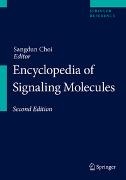Ulteriori informazioni
The second edition of this encyclopedia presents about 1000 chapters and includes thousands of biologically important signaling molecules and the content is built on the core concepts of their functions along with early findings written by some of the world’s foremost experts. The molecules are described by recognized leaders in each molecule. The interactions of these single molecules in signal transduction networks will also be explored. This encyclopedia marks a new era in overview of current cellular signaling molecules for the specialist and the interested non-specialist alike.
Currently, there are more than 30,000 genes in human genome. However, not all the proteins encoded by these genes work equally in order to maintain homeostasis. Understanding the important signaling molecules as completely as possible will significantly improve our research
-based teaching and scientific capabilities.
Sommario
From the contents 14-3-3.- 3-Phosphoinositide-Dependent Kinase 1 (PDK1).- 5-HTT.- 5-Hydroxytryptamine Receptor 2C.- 5-Hydroxytryptamine Receptor 6.- A-Kinase Anchoring Protein (AKAP).- A-RAF.- ABCA Transporters.- ABCA3.- ACAP1.- Acetylcholine (Nicotinic) Receptor.- Acetylcholinesterase.- ACK1.- ACSL4.- ACT.- Actinin Family.- ADAMTS13.- ADAP.- ADAP1.- ADAP2.- ADCY9 (Adenylyl Cyclase 9).- Adenomatous Polyposis Coli.- Adenylyl Cyclase.- ADGRB3.- ADGRG2.- Adiponectin.- ADP-Ribosylation Factor-6 (ARF6).- AGAP1.- AIFM1.- AIRE.- AKT.- Alpha-1-Syntrophin.- Alpha-2A Adrenergic Receptor.- ALS2.- AMP-Activated Protein Kinase (AMPK).- Androgen Receptor (AR).- ANT.- AP-4.- APO2L/TRAIL.- Apoptosis Regulator BAX.- Apoptosis-inducing factor 1, mitochondrial.- App.- Aquaporin.- ARAP3.- ARF1.- Arl8b.- Aryl Hydrocarbon Receptor.- Ataxia Telangiectasia and Rad3-Related (ATR).- ATF2.- ATP-Binding Cassette Subfamily A Member 2.- Aurora Kinases.- Axin.- AXL.- B Lymphocyte Antigen CD19.
Riassunto
The second edition of this encyclopedia presents about 1000 chapters and includes thousands of biologically important signaling molecules and the content is built on the core concepts of their functions along with early findings written by some of the world’s foremost experts. The molecules are described by recognized leaders in each molecule. The interactions of these single molecules in signal transduction networks will also be explored. This encyclopedia marks a new era in overview of current cellular signaling molecules for the specialist and the interested non-specialist alike.
Currently, there are more than 30,000 genes in human genome. However, not all the proteins encoded by these genes work equally in order to maintain homeostasis. Understanding the important signaling molecules as completely as possible will significantly improve our research
-based teaching and scientific capabilities.

